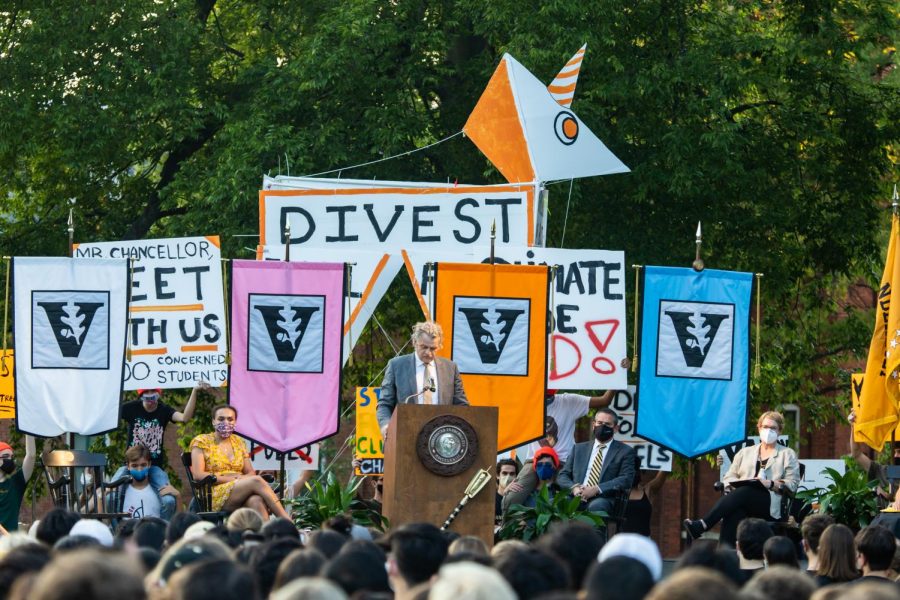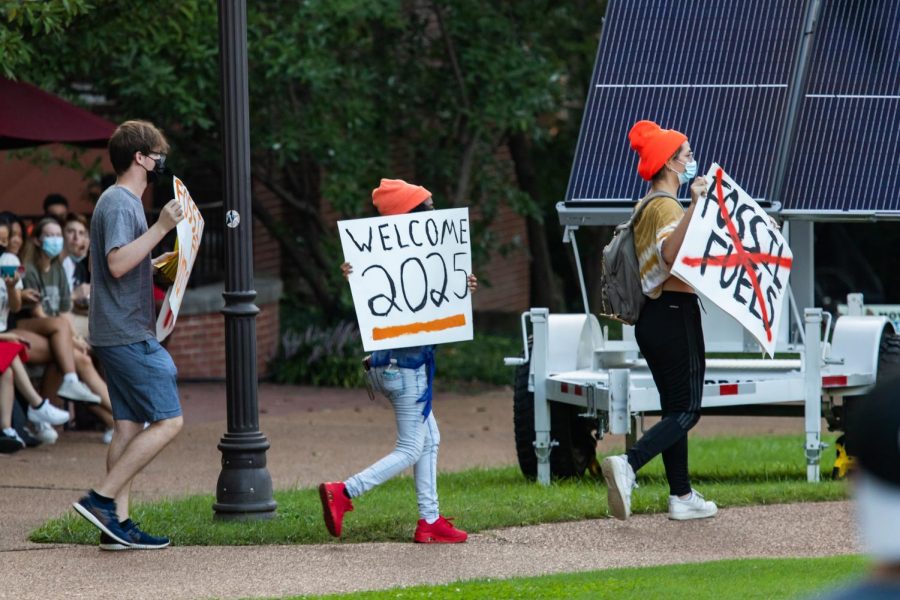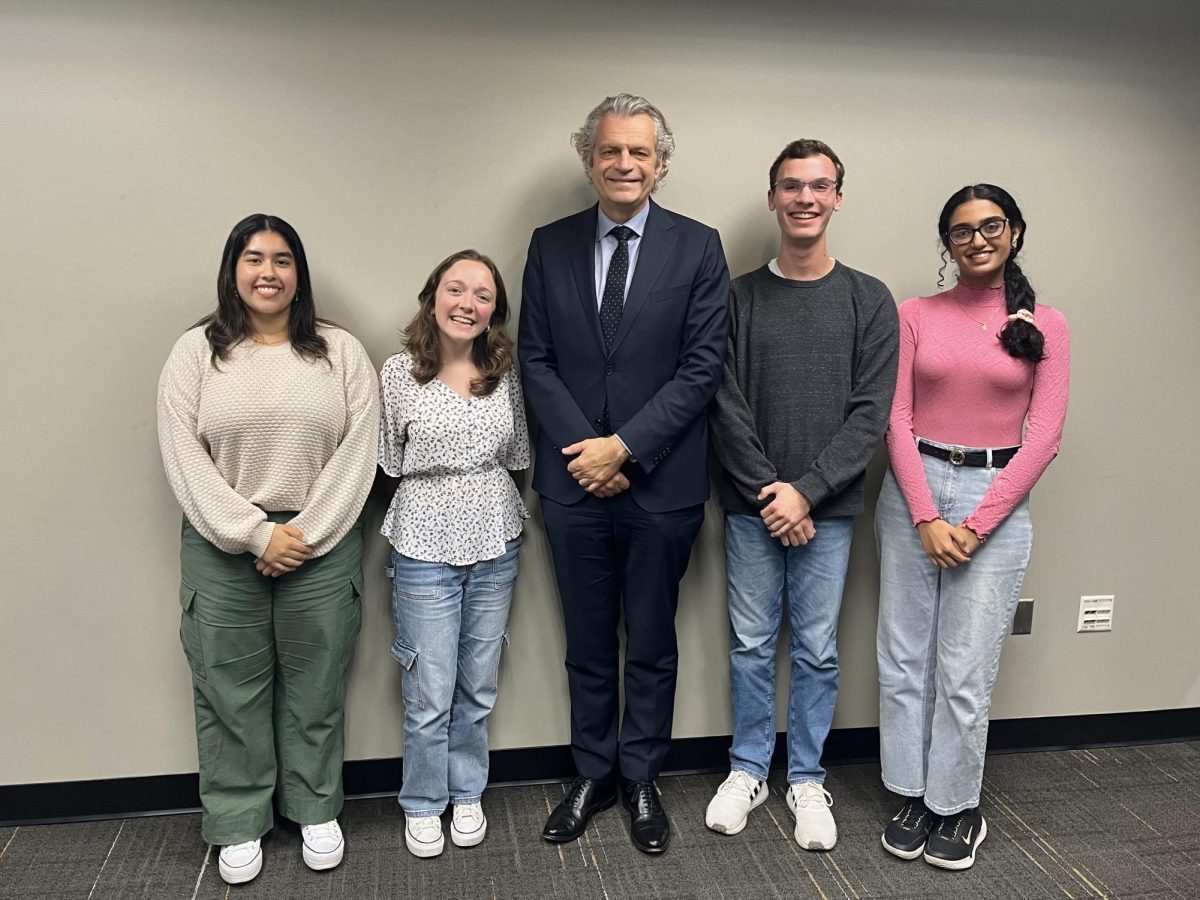UPDATED: This piece has been updated to reflect past initiatives by VSG and the Graduate Student Council concerning fossil fuel divestment.
Dores Divest held a demonstration during Chancellor Daniel Diermeier’s speech at Founder’s Walk on Aug. 22 as their first protest of the 2021-22 school year. The group’s mission is for Vanderbilt to divest from fossil fuels.
Following the Class of 2025’s parade through a crowd of student organizations—a long-standing first-year tradition—students sat on Alumni Lawn and were addressed by various members of the Vanderbilt community, including Student Body President Hannah Bruns and Chancellor Daniel Diermeier. Exclusively during Diermeier’s speech, members of Dores Divest and SPEAR—clad in orange beanies and clothing—waved signs behind the stage with phrases such as “climate code red” and “Mr. Chancellor meet with us.” Dores Divest also distributed brochures about their organization to attendees.
“I am so proud of the other activists I was with today for being respectful, polite and for being brave and going out there,” Miguel Moravec, an organizer of Dores Divest, said.
A unicorn sculpture—which members of Dores Divest carried back and forth behind the stage—was the centerpiece of the demonstration, as it was for their Feb. 23 protest. Moravec stated that the unicorn serves to lighten the mood surrounding climate change, a topic he claimed is often “depressing.”
“It’s ridiculous that we should be here at all,” Moravec said. “Most top 20 universities have started divesting, so if we have to be absurd to get that across, we will.”
According to a document sent in the Dores Divest GroupMe, the demonstration had a three-pronged goal: to introduce divestment to the Class of 2025, disrupt Diermeier’s speech and garner the support of Vanderbilt alumni and parents via university footage of the event. The document specifically mentioned Dores Divest’s desire for Diermeier to meet with VSG and student leaders regarding fossil fuel divestment.
“He [Diermeier] makes proclamations about Climate Vault, claiming that students are involved, but the 1,300 students who signed a petition asking for divestment have not been consulted about fossil fuel divestment,” Moravec said. “You could almost consider it a dereliction of duty not to meet with your students about issues they’re concerned about.”
In an email to The Hustler, a university representative said that the Office of Dean of Students is investigating the demonstration to identify any possible infractions of university policies. Moravec claimed that all activists abided by university protocol, specifically referencing chapter five of the Student Handbook.
“Generally picketing, distributing literature, silent or symbolic protests (e.g., holding signs, wearing certain clothing, standing, etc.), or short and spontaneous verbal reactions to a speaker are acceptable forms of protest and dissent, as long as they do not block, obstruct, or impede, among other things, access to a meeting or activity, passage of persons or vehicles, the audience’s view or ability to pay attention, and/or the speaker’s communication or ability to speak,” chapter five of the Student Handbook read.
The representative also identified VSG and the Graduate Student Council (GSC) as alternative and more “constructive” avenues for students to share opinions and concerns. The VSG Senate unanimously passed two bills on Oct. 28, 2020, calling for the university to divest from fossil fuels. Similarly, the GSC passed a resolution by a “wide margin” on Nov. 13, 2020, supporting Vanderbilt divesting from fossil fuels.
“While we support the right of our students, faculty and staff to make their voices heard on issues they feel strongly about, this evening’s disruption was unproductive, disrespectful and deprived our first-year students of fully experiencing one of Vanderbilt’s most important traditions,” the email read.
Third-year German graduate student Marissa Schoedel said that she participated in the event due to her passion for climate activism and desire to involve new students in Dores Divest. She wanted to show the Vanderbilt community that the group is “serious” and should be “ taken seriously.”
“I [was] tired of sitting around and being anxious and being mad. I can do something; there are people here that support me in this,” Schoedel said. “You’re not alone and you don’t have to be alone, angry, anxious and sad.”
Sophomore Dante Hernandez also participated in the event and said that Dores Divest believes in “guerilla” and “unconventional” methods of protest. He differentiated Dores Divest from Divest VU, another on-campus climate organization, describing that Divest VU takes care of the “bureaucratic” side while Dores Divest is responsible for the “protest side” of climate activism. Similar to Schoedel, Hernandez hoped the event would give Dores Divest “notoriety” amongst the Class of 2025.
“We want to inaugurate the Class of 2025 so that they’re made aware so we can have fresh faces for the movement,” Hernandez said.
First-year Noah Weitzel and Sebastian Bujoi both said they enjoyed themselves at Founder’s Walk regardless of the protest and felt welcomed into the community. However, Weitzel had mixed feelings about the protest.
“I respect everyone who does peaceful protests; it’s honestly pretty cool,” Weitzel said. “But, when I look back and remember my Founder’s Walk, the pictures and the videos, that’s [the protest] going to be a part of it, and I don’t know if it was something that was necessary.”
Bela Watson—another first-year—similarly felt that the protest conveyed an important message but was inappropriate given the setting.
“It was effective but insensitive because it’s our first opportunity meeting [the Chancellor] and his opportunity to give us a welcoming address. I think we all understood the point and they were able to share their message, which I appreciate,” Watson said. “But, it also distracted from the Vanderbilt community. He was trying to give a very important message about inclusion and welcoming us to Vanderbilt.”
Bujoi said that Dores Divest’s message was contradictory to the sustainable image the university promotes of itself. These promotions include their Climate Vault partnership and commitment to reducing carbon emissions.
“I thought it was a little strange because Vanderbilt was advertising how they are farther ahead than practically any other university when it comes to sustainability and green power,” Bujoi said.
Brynn Leblanc, also a member of the Class of 2025, stated that she was proud of the demonstration. She additionally emphasized students’ right to peacefully protest.
“I’m proud to go to a university where people will stand up for what they believe in,” Leblanc said.
Student Body President Hannah Bruns, who both spoke at Founder’s Walk and spoke in favor of divestment at past Dores Divest protests, declined to comment about the demonstration at this time.
Moravec stated that a university administrator approached Dores Divest before the protest and asked them not to proceed. However, he said that the administrator confirmed that Dores Divest members were allowed to protest.
Although Diermeier did not directly address the demonstration during his speech, he did speak on the importance of civil discussion and free speech.
“You can and should argue and advocate for your positions, but in stating your argument, you should always be open to being convinced by the other side, open to learning something new, open to gaining a broader perspective,” Diermeier said.“Reject the simplicity of shouting and sloganing in favor of rigorous written debate.”











Teddy R • Aug 26, 2021 at 1:33 pm CDT
Vanderbilt hasn’t seen this level of sustained, coordinated activism in some time. If it’s true that the university staff has not yet met with these students, it may behoove the Chancellor to open a dialogue with the activists before a protest like this happens again. It’s terrible PR for his legacy. Just my two cents.
anonymous • Aug 25, 2021 at 3:31 pm CDT
immature and inappropriate
Jack • Aug 24, 2021 at 5:23 pm CDT
It’s surprising that these quasi-environmentalists didn’t even wear reusable masks for their protest. Also, what would divesting in the fossil fuels really do… investors will just buy the dip knowing that the stock price would rebound within the week. Maybe get involved in an environmental club that makes a difference (like cleaning the Tennessee River watershed)
Class of 18 • Aug 26, 2021 at 1:47 pm CDT
Yo climate flooding in a TN river literally just killed 21 people this week – everyone from FEMA to the Christian Science Monitor acknowledges climate change’s role in this. Same team bro
Some educational links for u on why divestment works also – its not sum secret, Shell admits it
Link:
https://www.csmonitor.com/USA/2021/0822/Record-flooding-in-Tennessee.-More-evidence-of-climate-change
https://350.org/press-release/shell-report-impact-of-divestment/
John Turner • Aug 30, 2021 at 1:29 pm CDT
That’s yesterday’s news.Yes, human activity affects climate change. That is what your reference indicated although at the time it had not been peer reviewed – probably has been since then, one would expect.
Your perspective appears to be relatively one-eyed. Communist China and India do not matter? Broaden your perspective a bit.
Brush up on your grammar and spelling.
Dores Divest Member • Aug 24, 2021 at 2:35 pm CDT
Proud to report that we have received an outpour of support from the campus community, including class of 2025. We believe it’s important to the story to share their words here. You can also see the quotes for yourself on our publicly available instagram page.
John Turner • Aug 23, 2021 at 3:37 pm CDT
Hijacking the Founder’s Walk for a publicity (advocacy, protest) stunt drives those are open to discussion away (from Vanderbilt).
Student Worried About Climate Change • Aug 24, 2021 at 2:09 pm CDT
If the Administration was “open to discussion” with the student government on this topic, the protest would not have been necessary. [You know what] rolls down hill – the Chancellor should hear these students out.
VU Alums for the Future • Aug 24, 2021 at 3:39 pm CDT
Climate change discussions have been occurring nationwide for decades (Al Gore, anyone?). Now, we are witnessing devastating natural disasters caused by a radically changing climate, and we know that it is driven primarily by corporations who are proving unwilling to make changes despite the fact that shifting to a green economy would yield up to $26 trillion in direct economic gains through 2030 (Source: https://www.un.org/en/climatechange/science/key-findings). So yeah, way to go ‘Dores, keep pushing for divestment, there are alumni standing with you.
John Turner • Aug 30, 2021 at 2:01 pm CDT
Very well written ad hoc piece by UN acolytes. Since the UN’s COVID debacle with Communist China’s influence, UN reports and studies are no longer trusted by default by many non-advocative readers.
Climate change discussions studiously avoid the climate change versus national security consequences. One is long term the other very short term.
Existential wars are very short term today for most nations. Perhaps it is time more attention and consideration was given to that issue versus climate change. Both are important.
Alumni for Divestment • Aug 24, 2021 at 3:52 pm CDT
You forgot a word there, John! Also, the fact that you call this act “hijacking” and a “stunt” shows you’re not actually aligned with the cause in any way. Don’t speak for those you don’t represent.
John Turner • Aug 30, 2021 at 10:45 am CDT
Free speech is irrelevant at Vanderbilt?
Alumnnus • Aug 30, 2021 at 11:36 pm CDT
Who is stopping you from speaking John? It seems like you just don’t enjoy receiving pushback.